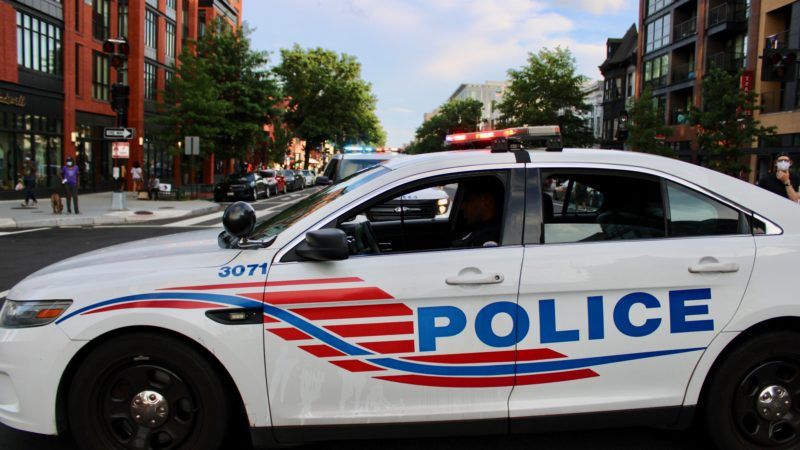Sluggishness of Police Reform Feeds Frustration
George Floyd's death triggered a long overdue cultural reckoning with race-related issues and inequities. It will be too bad, though, if the policing issues that set off the protests are forgotten.

Twenty-five years ago, The Los Angeles Times published a two-part investigative series I wrote about fatal shootings by police in Ventura County.
The first article quoted both grieving relatives and police officers who themselves were traumatized after the shootings. "My son is dead. I want to know why," said the mother of a 23-year-old who was shot by police after he had leveled an empty shotgun at them.
The second article explored the possibility of preventing such shootings through technology, policies, and training. It quoted a county prosecutor who investigated the shootings and who suggested that because so many of the people shot in justifiable homicides are drunk or under the influence of drugs, a reduction in substance abuse might help reduce the numbers of times police have to shoot people.
Protests after the death of George Floyd in the custody of Minneapolis police sent me back to these old news articles. Floyd wasn't shot, but his death raises similar issues. I wondered what, if anything, has changed.
The anger and frustration in reaction to Floyd's death, after all, surely has something to do with the feeling that this has been a known issue for decades now but has not been solved. That grim truth is unavoidable when reading these old news articles in the context of current developments.
That feeling is a nationwide phenomenon. My former New York Sun colleague Errol Louis, himself the son of a New York police inspector, wrote a column enumerating cases in New York from the 1970s, 1980s, and 1990s. "Demonstrations against police misconduct get particularly heated because communities remember prior injustices. Layer after layer of incidents over the years become part of a litany of cases stretching across decades," he wrote, describing it as "a catalogue of pain and grievance passed down across generations in black communities."
As The Washington Post put it in a 2019 article, "Years of controversial police shootings, protests, heightened public awareness, local police reforms and increased officer training have had little effect on the annual total." The headline of that article? "Four Years in a Row, police nationwide fatally shoot nearly 1,000 people."
The post-George Floyd protests have blossomed into a broader, long overdue cultural reckoning with race-related issues and inequities. It will be too bad, though, if the policing issues that set off the protests are forgotten amid a focus instead on other only distantly related topics such as antiracism education in elementary schools or reparations for slavery.
The final quote—the "kicker," in newspaper jargon—in the solutions-from-experts part of my police-shootings series came from George Kelling, a criminology researcher and the author, with James Q. Wilson, the author of the influential March 1982 Atlantic article "Broken Windows: The police and neighborhood safety."
"To George Kelling, who teaches policing at Harvard and Northeastern universities, the answer is community policing—putting more officers on foot patrol on regular beats to solve problems in neighborhoods they know," I wrote.
Kelling told me, "When you've got police officers that are remote from communities, where they're kept in cars, you've got edgy police, frightened police, and that's where you get problems."
I didn't disclose it in the 1995 Times article, but Kelling had been my professor in a Harvard class, "Workshop in Criminal Justice: Municipal Policing."
As Kelling and Wilson had described it in the "Broken Windows" article, a careful, scientific study of Newark, N.J., found that "officers walking beats had higher morale, greater job satisfaction, and a more favorable attitude toward citizens in their neighborhoods than did officers assigned to patrol cars."
I tested the proposition as a student in Kelling's class by spending part of a night with Cambridge, Mass., police officers walking the beat, and part of it in the back seat of a police car. Precisely as the theory predicted, the officers in the car described the area as dangerous and drug-infested, while the ones on foot described the same exact streets as a pretty good neighborhood. The officers in the car drove out of the neighborhood to pick up dinner; the ones on foot stopped in at a local establishment.
Kelling died in 2019 and Wilson died in 2012, after significant crime reductions (the causes of which are hotly debated) but before either man could help police or any other government- or human-run agency achieve anything close to perfection. In unionized government bureaucracies and even in many other human organizations, change is hard and slow.
Let's hope, though, that the changes needed now finally happen quickly enough that I'm not needed back making these same points again in another 25 years, which would be 2045.


Show Comments (38)